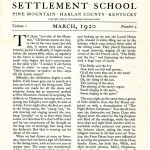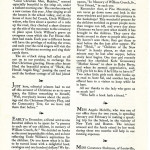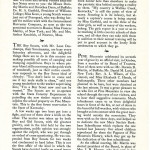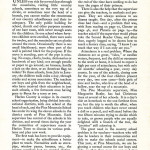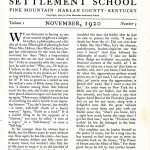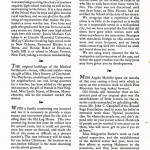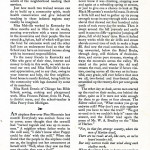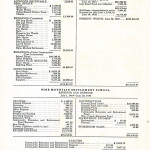Pine Mountain Settlement School
Series 17: PUBLICATIONS PMSS
NOTES – 1920
March and November
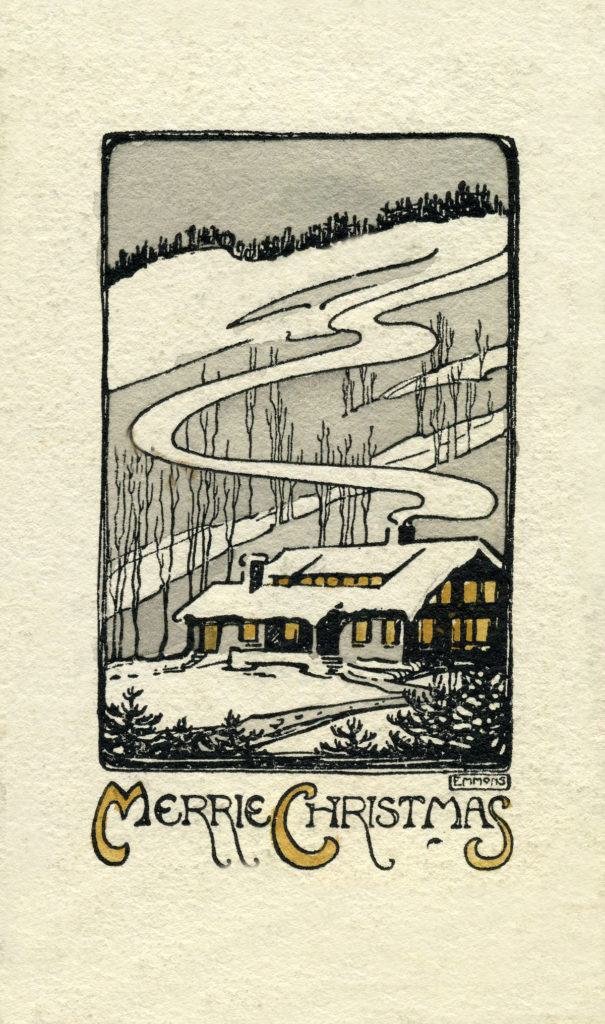
“Merrie Christmas.” [christmas_cards_010.jpg]
NOTES – 1920
“Notes from the Pine Mountain Settlement School”
March and November 1920
GALLERY: NOTES – 1920 March
“After [Christmas caroling] at all the houses in the school valley, and at the house of Aunt Sal Creech, Uncle William‘s widow, who lives about a quarter of a mile up the road, [the singers] climbed a short distance…to place upon Uncle William’s grave an evergreen cross which the Far House children had made.”
- NOTES – 1920 March, page 1. [PMSS_notes_1920_mar_001.jpg]
- NOTES – 1920 March, page 2. [PMSS_notes_1920_mar_002.jpg]
- NOTES -1920 March, page 3. [PMSS_notes_1920_mar_003.jpg]
- NOTES – 1920 March, page 4. [PMSS_notes_1920_mar_004.jpg]
TAGS: NOTES – 1920 MARCH: Christmas, lyrics, wassailers, books, visitors, Boy Scouts, Girl Scouts, anniversaries, Sal Creech, Angela Melville, fundraising, Constance Sheltman, Mary Blackburn, Julia Minshall, Lucretia Garfield, Emily Storer, Katherine Wright, Alice Butler, Blanch Peacock, Dorothy Martin, Dorothea Dann, H.A. Garfield, Leon Deschamp, trustees, Darwin D. Martin, Elizabeth C. Hench, J. R. Morton, C.N. Manning, Samuel M. Wilson, pageants, Marguerite Butler, one-room schools, executive committee
TRANSCRIPTION: NOTES 1920 March, Vol. I, No. 4
P. 1
NOTES FROM THE
PINE MOUNTAIN
SETTLEMENT SCHOOL
PINE MOUNTAIN * HARLAN COUNTY * KENTUCKY
Copyright, 1920, by Pine Mountain Settlement School
Volume I MARCH, 1920 Number 4
TO those “yon side of the Mountain,” Christmas means one day, or two at the very most; but this side, it means days and days, brimful, joyful. Unofficially, it begins weeks before the twenty-fifth, when, as regularly as the hymn is raised at breakfast, some small voice begins the day’s conversation at the table with: “I wonder if old Santie Claus is aimin’ to come this year,” or, “Only seventeen — or twelve — or five — days till old Santie comes!”
Officially, the celebration begins a week before. Each house goes out in search of a tree, and sets it up in the living room. Then wreaths are made for all the doors and windows. Santa has an improved method at Pine Mountain. Instead of surprising the children on Christmas morning with a tree sprung into full glory over night, he asks us to help. Every night after the fires are made in the living rooms, the “young ‘uns,” beside dancing and singing around the tree, hang “pretties” on it, so that when Santa comes on Christmas Eve that’s off his mind and he can concentrate all his thought on the long row of stockings that hang from the fireboard. But that is running too far ahead of the story.
When we had dinner at noon on Saturday, there had not been a sign of Christmas in the dining room, such as met our eyes at supper time. The room was transformed. A tree almost twenty feet high stood in the center, its top tickling the rafters. Two small trees stood on each side of all the entrances, and every window was wreathed. Just as we took our seats we heard singing, and looking up we saw the Laurel House girls, dressed in white, filing out on to the balcony which runs around three sides of the dining room. They placed themselves at equal intervals, singing all the lovely verses of the old French carol, “The Holly and the Ivy,” and festooning the balcony with a huge rope of laurel.
“The Holly and the Ivy
Now both are full well grown;
Of all the trees that are in the wood
The Holly bears the crown.
Oh, the rising of the sun,
The running of the deer,
The playing of the merry organ,
Sweet singing in the quire,
Sweet singing in the quire.”
The next night, at the same time, a group of little children from the Far House surprised us with dramatization of “The Night Before Christmas.” You should have seen the diminutive red Santa Claus who slipped down the stairs by the big fireplace and filled all the stockings, while the children slept and eight little reindeer with remarkable antlers pattered and pawed on the balcony above, taking the most intelligent interest in all that went on! Tuesday, the Farm House boys were influential in securing the presence of the whole Claus family: Santa, his little boy, Willie, and their favorite relation, Merry Christmas, who, in spite of her age, was quite a “peart” lady. On Christmas Eve we came into unlighted room at supper time, and, while the Big Log House children sang “Holy Night” in an anteroom, a Christmas angel…
[1]
P. 2
…went about, lighting candles on the tables, throwing circle after circle of little faces into soft relief until the whole room was lighted.
The wassailers awakened us long before dawn the next morning. “Ye Shepherds, Leave Your Care of Flocks so Fleecy,” and “Good Christian Men, Rejoice,” seemed especially beautiful in the crisp air, under a radiant morning star. The carolers started a new custom this year. After singing at all the houses in the school valley, and at the house of Aunt Sal Creech, Uncle William‘s widow, who lives about a quarter of a mile up the road, they climbed a short distance up the side of the mountain to the cemetery to place upon Uncle William’s grave an evergreen cross that the Far House children had made. Each year a different house will have the privilege of making the cross, and each year the carol singers will visit the grave on Christmas morning and sing their carols there.
The six o’clock rising bell called us all out onto our porches, to exchange the first Christmas greeting, House after house lifted the beautiful strains of “Hark, the Herald Angels Sing,” passing the carol on until the farthest cottage of all had joined in.
*****
JUST here, editorial scissors had to cut off this account of Christmas so as to save space, the Editor remarking to himself, “Well, everybody knows about the stockings and the Christmas Nativity Play, and the Community Tree, for we have told them that before.”
*****
EARLY in December, a friend sent us one hundred dollars to be spent for “a present to each one of our children, in memory of William Creech, Sr.” We decided on books as the most imperishable riches, and as best reflecting Uncle William’s aspirations for the children. Do you know what it is like to be turned loose with a delightful book catalog and one hundred dollars? We forgot the work-a-day world, clothes to be mended, letters to be written, floors to be scrubbed, and lost ourselves in the world of imagination as we decided who should have “The Boys’ King Arthur,” and who “Twenty Thousand Leagues Under the Sea”; what little girl would best appreciate a gorgeous “Pied Piper of Hamelin,” and who would laugh loudest over “Uncle Remus’ Songs and Sayings.” Ordering the books was almost as much fun as undoing the bundles and writing the children’s names, “In Memory of William Creech, Sr., Your Friend,” in each one.
Remember that, at Pine Mountain, we can never go downtown and look in the store windows and pore over the pictures in the bookshops! This wonderful present for the children enriched us grown people more than tongue can tell, and every day since Christmas we have seen what wealth it has brought to the children. They carry the books around to show to people who possibly haven’t seen them; they get them to read before the fire just after supper. We find “Heidi,” or “Children of the New Forest” in handy places so that not a minute may be lost after supper before study hour begins. One tiny girl recently carried her cherished Kate Greenaway “Mother Goose” to show to Baby Berto, and when he seemed appreciative, said, “I’ll give hit to him if he’d like to have it!” Two other little girls took their books up to read to Aunt Sal, and another has just offered hers to a visitor to keep while he is here.
All our thanks to the lady who gave us so much joy!
“Who hath a book hath a friend.”
*****
MISS Angela Melville, who was one of our office force for two years is spending January and February in making a speaking trip for the School, in the vicinity of New York and Boston. The interest aroused and the funds raised by her work during these two months will help in our running expenses.
*****
MISS Constance Sheltman, of Louisville, takes the place of Miss Mary Blackburn, who has been our bookkeeper for the last few months. Other changes have taken place on the faculty, and the new workers included Miss Julia Minshall, of Marietta,…
P. 3
…Ohio; Miss Lucretia Garfield, of Williamstown, Mass; Miss Emily Storer, of Waltham, Mass; Miss Katherine Wright of Bristol, Tenn; Miss Nina Lawson, of Jamestown, N.Y.; Miss Alice Butler, of Boston; and Miss Blanch Peacock, of Buffalo, We have had several visitors since the last Notes went to you: the Misses Dorothy Martin and Dorothea Dann, of Buffalo; Dr. H.A. Garfield, President of Williams College; Miss Keen [Martha Ann Keen], a young Scotch woman just out of Petrograd who was fitting herself for welfare work with the International Harvester Company, as soon as she was permitted to return to Russia; Miss Frances Maltby, of New York; and Mr. and Mrs. Arthur Kendrick, of Newton, Mass.
*****
THE Boy Scouts, with Mr. Leon Deschamps, their Scoutmaster, are busy every Saturday afternoon, and the delightful things there are to do in this country are making possible all sorts of camping and tramping expeditions. Boys in whom pioneer blood still runs strong make quick work of woodcraft, just as their native courtliness responds to the Boy Scout ideal of chivalry. “You don’t have to come and see if my mule stalls is clean,” said one young tenderfoot to the worker supervising him; “I’m a Boy Scout now and can be trusted,” The Scouts are to cooperate with the State Forestry Department in patrolling the new timber reserve which adjoins the school property on Pine Mountain. This is the first forest reservation in the State of Kentucky,
A few weeks ago two boys got into a fight and one of them drew a knife on the other. The matter was taken up by both Boy and Girl Scouts, with the greatest gravity, and in the trial held by the two organizations, public opinion was strongly against the culprit, who was put through an ordeal of cross-questioning. He was suspended from Boy Scouts for two weeks and condemned to hard labor. This is not the first affair of the kind in which the Scouts have decided justly on moral issues in the behavior of our young people,
Miss Lucretia Garfield is in charge of our Girl Scout group this group has not been organized as long as the Boy Scouts, but the girls respond just as eagerly, and girl-scouting has a head-start with us, where a girl gets the training an ordinary Scout must go to camp for, in her life in the school. Responsibility, personal tidiness, helpfulness and resourcefulness are habits already inculcated in our girls; but we must work harder here than elsewhere to make the patriotic idea behind scouting a reality to them. “My country is Wallins Creek, Kentucky,” is still the point of view of many. Scouting is in its infancy, but already a captain’s course is being started by Miss Garfield, and to this three of the older girls as well as many of the workers belong. The girls expect in a year or so to be teaching in little country schools of their own, and all that they can take with them in addition to their normal training will be put to good account in the lonely little settlements to which they go.
*****
PINE Mountain celebrated its seventh year of grace by an official visit, in October, from a number of its Board of Trustees. Four of them were with us: Mr. Darwin D. Martin, of Buffalo; Mr. Daniel M. Lord, of New York; Rev. A.L. Wilson, of Cincinnati; and Miss Elizabeth C Hench, of Indianapolis. Three other members had planned to be here, but were detained at the last minute. It was a great pleasure to us who live at Pine Mountain to view the school through the eyes of our visitors and to hear their suggestive comments. Much refreshment came to us from delightful hours in front of the fire or out of doors in the beautiful fall weather, with visitors who brought us into contact with the great moving world outside the mountains, They were with us for three days and helped us to dedicate the new Mary Sinclair Burkham Schoolhouse which replaces the one burned last January. Our school children reproduced for them the Pageant of Pine Mountain History, which they got up for the dedication of the first schoolhouse.
At the official meeting, Mr. Martin [Darwin D. Martin] was elected president of the Board, in place of Mrs. J.R. Morton, who had sent in her resignation. Mrs. Morton becomes our vice-president. Mr. C.N. Manning continues as treasurer and Miss Hench [Elizabeth Hench] as secretary. The terms of office of Mr. Samuel M. Wilson, of Lexington, and Professor H. H.…
[3]
P. 4
…Barrows, of Chicago, had expired and their places were not filled, as it is the present policy of the Board of Trustees to make the Board a more closely organized group than it had been in the past.
*****
UNLESS you ride for several days through the mountains, visiting little country schools, sometimes on the very top of a divide, or sometimes near the head of a branch, you cannot realize the remoteness of our country schoolhouses and their inadequacy. The only public building for school, church, and other purposes consists of one bare room, with never enough seats for the children. In one school where forty-two children were enrolled, there were seats for twelve, and the remainder sat on planks around the room. Occasionally there is one small blackboard; more often part of the wall is painted black for the purpose. If the stove is standing, part of the pipe is missing. no maps, charts, books, dictionaries, or handwork of any kind; not enough pencils or paper to go around; no brooms; hardly a lock on the door, or an American flag; no toilets! To these schools, from July to January, the children walk miles a day, through creeks and across mountains. The teachers are boys and girls from the neighborhood, who have received their education in just such schools, a few fortunate ones having gone to Berea for a term or two.
Harlan County is unique in its country school organization, being divided into educational districts, with one school at the head of each, and the Pine Mountain School has under its wing the eleven schools in the district north of Pine Mountain. Each supervisor has control of the schools in his division, and several times during the year, the committee of supervisors meets in Harlan Town to discuss its various problems and plan new work.
The first task has been to provide equipment — to make the schoolhouse a better place to teach. Necessities such as stove pipe, window panes, brooms, etc., the country supplied; but we wanted dictionaries, books, and maps. At six of the schools, “box suppers” were held, to raise money for these and for handwork for the younger children. Half a day’s visit at a school would show you the need of work for the tiny ones, who, from eight till four spend but a few minutes spelling their words and reading their lessons to their teacher, and the rest of the time have nothing to do but turn the pages of their primers.
There is also the help that the supervisor can give the teachers, in methods and program. They are always anxious to see classes taught. One day, after the primer class had read — And a problem that was, with Sam reading on page 72, Chester on page 46, and Phronie on page 24 — the teacher asked if the supervisor would please take the Second Reader Class, and after that, eagerly begged to be shown how to teach a history class, saying, “I know I can teach that way if I can only see you.”
Attendance is a real problem. Where the distances are so great,” tides,” or swollen waters, frequent, and the child so necessary to the work at home, it is hard to expect a high percent of attendance; but with only six months’ schooling a year, every day counts. In one of the schools, closing now for the year, of the four children present every day, two now come — little girls of nine and twelve, who live at the head of a hollow, near the top of a mountain.
The Pine Mountain Supervisor, Miss Marguerite Butler has had Christmas trees at several of her schools. It is a day’s ride on horseback to the one farthest from us; but the trip is worth the effort, when you reach children who have never owned a doll or a pencil, and will stand before the tree fifteen minutes trying to decide which to take, or grown people who are equally delighted with a branch of the tree, the ” pretties” still adorning it.
The great need in the country school problem is for teachers — teachers who will also be leaders in their communities and able to make the schools social centers. This year, at Pine Mountain, we are beginning a normal course for our boys and girls, so that they may go out as better teachers to their communities.
| EXECUTIVE COMMITTEE Miss Katherine Pettit Mrs. Ethel deLong Zande Treasurer, C.N. Manning, Security Trust Co. Lexington, KY |
The Pine Mountain Notes are published irregularly, three or four times a year, and are sent to everyone on our mailing list. This is the fourth number. |
[4]
The Marchbank Press
New York
*See also: Darwin D. Martin Photograph Collection
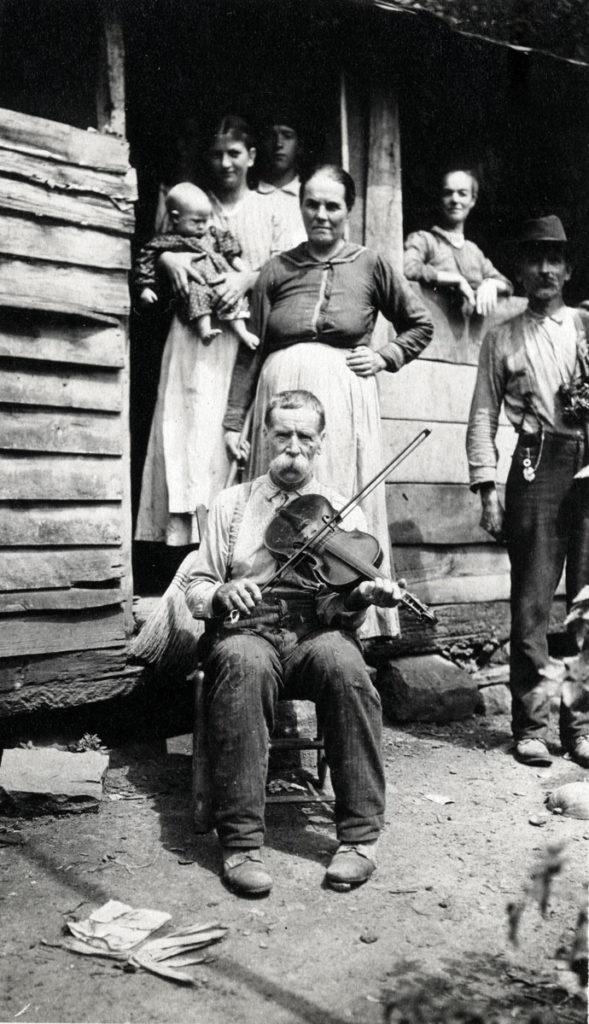
A fiddler on Cutshin. (Fiddler John Lewis, 1930s?) [mccullough_II_075a.j[g]
“It is a dear desire of the School that its boys and girls become rural teachers, and we are glad for the stiffening of requirements that makes the profession a more worthy one.”
- NOTES – 1920 November, page 1. [PMSS_notes_1920_nov_001.jpg]
- NOTES – 1920 November, page 2. [PMSS_notes_1920_nov_002.jpg]
- NOTES – 1920 November, page 3. [PMSS_notes_1920_nov_003.jpg]
- NOTES – 1920 November, page 4. [PMSS_notes_1920_nov_004.jpg]
TAGS: NOTES – 1920 NOVEMBER: Fiddler John Lewis, buildings, James Madison Callahan, McCoy Callahan, Raymond Ritchie, Bonnie Baker, Emily Hill, Medical Settlement, Lura Parsons murder, The Road funding, airplanes, road construction, poetry, balance sheet, Celia Cathcart Holton, Mary Emery, Joseph Smith Duncan, Angela Melville, John C. Campbell, Marguerite Butler, Ruth Dennis, Marchbanks Press
TRANSCRIPTION: NOTES November, 1920 Vol. I, No. 5
P. 1
NOTES FROM THE
PINE MOUNTAIN
SETTLEMENT SCHOOL
PINE MOUNTAIN * HARLAN COUNTY * KENTUCKY
Copyright, 1920, by Pine Mountain Settlement School
Volume I NOVEMBER, 1920 Number 5
WE are fortunate in having as one of our nearest neighbors a delightful talker, a philosopher, and a fiddler all in one. What a gift of phrasing he has! When Mrs. Holton, then Miss [Celia] Cathcart, began her solicitations for the road, he characterized her thus: “She’s a long-minded woman; she can see way yander ahead of her.” Fully in sympathy with the road project, he said to her: “Why, yes, I’ll help ye. I believe in the road. I allus have a leetle chinkapin money in my pocket, an’ I hain’t no hog with hit, nuther; I’ll give ye a nickel for it!” It was as generous a nickel as was the widow’s mite of Bible times. Our nurse was “a diadem among them that follered carin’ for the sick; she’d take you when you were plumb disencouraged and hearten you up again.” How many delightful ways he has of describing his wife’s health to an inquiring listener: “Yes, she’s hearty, but weakly — a stout, well-built chunk of a heavy woman.” Again, “Gaily as a buck!” It is a fearful thing to be the opposite of a “diadem;” you may be called “a turn of a rogue,” or a “hell-hound,” or even a “hell-hag.”
In his younger days he always had a fiddle, but for fifteen years he went without one. Now again he has his violin — has been offered twenty dollars and fifty cents for it many times, but wouldn’t take fifty for it! He used to wrap it in an old kerchief of his wife’s and come up to play for us, his favorite tune being the march Napoleon played “when he led his troops over the Rocky Mountains,” a close second being one that General Grant used to play when he led his forces against the enemy. It troubled the dear old fiddler that he had no case to protect his violin. “I need to shade her from the a’r. Did you ever hear a fiddle like this? Why, hit’s the clearest, melodiousest, loudest-ringin’est one that ever I heerd.” And then followed his philosophy of music: “I take my fiddle when things are botherin’ me, maybe the financial matters of the world, an’ I sit down, an’ play me a tune, an’ that leads to another, and, don’t you know, I feel better. Or when the aggravations gethers round about me, or I get mad, I can set down an’ play, an’ pretty soon the aggravations is plumb driv’ away.” But I want a case for her.” An order went to New York for a fiddle case for our fiddler, but the order was arrested, and back came a case that Signor Adolf Betti of the Flonzaley Quartet had no use for anymore, along with a delightful note that the great violinist hoped to come down and play with our fiddler someday. “Don’t you know, hits a sight how much better she rings since I got her that case,” says he. ” I’d never take nothing. for hit; hit belonged to the boss-fiddler of the world!”
Our neighbor can do justice to himself to the power of music, but for a long time, he has wanted to find someone to write an adequate book on the theme, The Power of Steam and the Mind of Man.” For these great forces he felt he had neither knowledge nor language. Many and many a time has he come and given us all the illustrations he knew of both these themes. But his quest for a book-writer has been as vain as that of Diogenes for his honest man. Now the pleading always ends this way:…
P. 2
“Get me somebody to write a poem that I can make a tune to, an’ then make him write a book, an’ when hit’s printed, why I’ll — I’ll buy one!”
*****
WE are establishing a high school course this year instead of a teacher’s training course. A new state law governing the choice of teachers requires high school training as well as normal training in the future. It is a dear desire of the school that its boys and girls become rural teachers, and we are glad for the stiffening of requirements that makes the profession a more worthy one. Five boys and girls who graduated last year from our academy course are doing first-year high school work here this winter. James Madison Callahan is at Lincoln Memorial University, McCoy Callahan is taking high school work in New Orleans, Raymond Ritchie is at Berea, and Bonnie Baker at Hindman [Settlement School]. Emily Hill is at school in Mount Vernon, New York, taking a course in woodworking.
*****
THE original buildings of the Medical Settlement — house, office and stable — were the gift of Mrs. Mary Emery, of Cincinnati. The Playhouse, consisting of one large room for neighborhood use and living quarters for a teacher, has been added to the group this summer, the gift of friends in New England. Miss Emily Storer, of Boston, Massachusetts, will be the resident worker this winter.
*****
WITH a family numbering one hundred and ten it is necessary to provide a more roomy and convenient place for the sick or ailing than the Old Log House. This two-roomed log house has done its valiant best for several years, but it could not provide even hot water on demand, and made the life of the nurse as difficult as a pioneer mother’s. The new Infirmary will be ready for use before Christmas. Its location on a sun-bathed hill slope is the most charming on the school grounds.
*****
THE Boy’s House built and furnished by our friend, Mr Joseph Duncan of Chicago is nearly finished, and has been full of boys since school opened in August.
*****
WE are struggling to escape from the grief and the shadow of a hideous crime.
On September 7, Miss Lura Parsons, a member of our faculty since June, was assaulted and murdered on the trail across Pine Mountain. She had been away on a short vacation, And on leaving the train, started alone for the school, as those of us who like to walk have done many times before. The crime was not discovered until two days later, as Miss Parsons had not notified the school of the date of her return.
We recognize that a repetition of this crime is as little to be expected as it would be on a respectable street in a well-policed city, But we have accepted the fact that old times have gone when women were safe alone anywhere in the mountains. Strangers with standards foreign to this section are more and more frequent, and on lonely trails, connecting with the railroad we shall not travel alone any more.
We are seeking every resource for the investigation and prosecution of the case, and before the paper reaches you the daily press may have given you its developments.
*****
MISS Angela Melville spent six months of this year raising a fund with which to carry on the extension work to which Pine Mountain has long looked forward.
Old friends will remember that an important part of our original plan was the establishment of little centers on the remoter creeks untouched by upbuilding influences. Mr. John C. Campbell of the Russell Sage Foundation used to state his belief in extension work thus: “Spread yourselves thin. Go where the people are, and don’t depend only on your parent school. Hundreds of people can be reached if you send out to them, who will never get to you if you sit at home.“
Miss Marguerite Butler‘s work as rural school supervisor, and the establishment of the medical center last year, were our first efforts at moving Muhammad to the mountain, and they have demonstrated how keen our neighbors are for better-trained leadership. Sewing classes, Sunday schools, playground days, district nursing, are crying needs of every little community — and the neighbors will do all they can to provide for them.
[2]
P. 3
THE original extension plan comprises five health centers at a distance of from seven to thirteen miles out from the School. At these points a small residence cottage is to be established to house a nurse and a Bible and industrial worker, who will work not only with the teachers and children in the near-by district schools, but with the adults of the neighborhood needing their services.
Just how much two trained women can do to build up a community spirit, teach health conservation, and give industrial teaching in these isolated regions may readily be imagined.
Miss [Angela] Melville worked in Kentucky for three months and in Ohio for six weeks, meeting everywhere with a warm interest in the mountains and their people. She has raised $14,896.00, half of which will go into the fund for extension work, and the other half into an endowment fund, so that the School may have an increased income along with its increased responsibilities.
To the many friends in Kentucky and Ohio who gave of their time, interest, and money to help in this work, we wish to extend our own and Miss Melville’s thanks and appreciation, and to say that, owing to your interest and help, the first neighborhood house is nearly finished, being built by the community with logs donated by some of its members.
Miss Ruth Dennis of Chicago has Bible school, sewing, cooking, and playground work. Miss Frances Palmer, from Saint Paul, is district nurse, and the school-teacher is Miss Peavy from Michigan.
*****
AN airplane flew over Pine Mountain last month! Everybody was excited. Some ran to cover; some thought that the sawmill had “turned roguish and was up to meanness.” A neighbor whose father works in the mill, said. “I didn’t know what Pappy could be doin’ with the mill.” When she found that the people in the airplane could see us, she laughed out her amusement at herself with. “Well, when they saw me, they sure thought they saw a fool!”
*****
THE progress of the Pine Mountain road has been without haste and without rest.
Six years ago, we had a Dream of a Road.
Three years ago we had a Road Fund.
Next year we hope to have The Road.
There is about its history a slow rhythm suggestive of classic Roman roads, which should augur well for its quality as a finished road. It started at the railroad, sauntering along so easily that one would never know it was climbing, stopping now and again at a refreshing spring or stream, or just to give one a chance to look at Big Black Mountain’s wonderful mass. It struck a little hill and had to gather up its young strength to eat its way through with a steam shovel that chewed out four hundred cubic yards of rock every day for weeks. Then it swept around the hill joyously and easily until it came to cliffs — a genuine jumping-off place, full of old bears’ dens. Here it halted many weeks while the air drills and steam shovels moved tons of rock to make a huge fill. And now the road continues its climbing unwearied, below the Rebel Rocks, through deep, still thickets of rhododendron, and across pure streams, viewing always the mountain across the valley. We stand at the point where the old trail crosses the road, and wonder if future visitors, coming across all the way on its beautiful, easy grade, will ever believe that once we all, two-footed and four-footed alike, scrambled up the twenty-five per cent grade trail!
The other day at dusk, seven men started up the road on their mules, one behind the other, quite as if it were not wide enough for them to go three or four abreast. The Editor called out, “What makes you go up endwise still? Why don’t you ride together until you have to take the trail?” “We got so used to it we couldn’t help it” came the answer, and the Editor read again the poem of Mr. W[illiam] A. Bradley on the “Men of Harlan.“
“For, in that far, strange country, where the
men of Harlan dwell,
There are no roads at all, like ours, as we’ve
heard travelers tell.
But only narrow trails that wind along each
shallow creek,
Where the silence hangs so heavy you can hear
the leathers squeak,
And there no two can ride abreast, but each
alone must go,
Picking his way as best he may, with careful
steps and slow.”
[3]
P. 4
PINE MOUNTAIN SETTLEMENT SCHOOL
BALANCE SHEET — JUNE 30, 1920
(See image of page 4 in the Gallery above)
The Marchbank Press
New York
[4]
Previous:
NOTES – 1919
Next:
NOTES – 1921
See Also:
EVENTS CHRISTMAS at Pine Mountain Settlement Guide
EDUCATION Guide
MEDICAL Guide
LADEN TRAIL or The Road
Return To:
NOTES – INDEX

